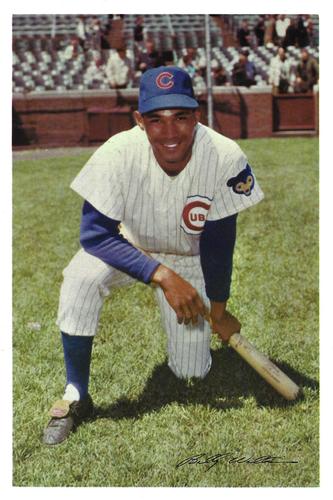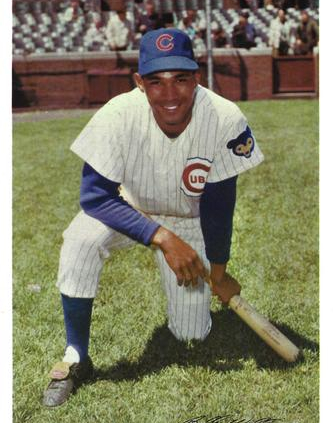June 29, 1969: Fergie Jenkins outduels Bob Gibson on Billy Williams Day as Cubs star ties NL consecutive-games mark
 On a day “ball players dream about,” wrote Bill Gleason of the Chicago Sun Times, Billy Williams’s consistency was on full display as the Chicago Cubs outfielder tied, and then broke, the National League consecutive-game record.1 The Cubs were celebrating Billy Williams Day at Wrigley Field, and in the first game of the Sunday doubleheader against the St. Louis Cardinals, the Alabama native matched former Cardinal Stan Musial’s mark of 895 straight appearances.2 “I’ve never had a day like this,” said Williams, who starred at the plate and in the field in Chicago’s 3-1 win.3
On a day “ball players dream about,” wrote Bill Gleason of the Chicago Sun Times, Billy Williams’s consistency was on full display as the Chicago Cubs outfielder tied, and then broke, the National League consecutive-game record.1 The Cubs were celebrating Billy Williams Day at Wrigley Field, and in the first game of the Sunday doubleheader against the St. Louis Cardinals, the Alabama native matched former Cardinal Stan Musial’s mark of 895 straight appearances.2 “I’ve never had a day like this,” said Williams, who starred at the plate and in the field in Chicago’s 3-1 win.3
“Billy Williams is automatic in many ways,” gushed Gleason, “but a machine he isn’t. They don’t make nice machines.”4
Entering the day, manager Leo Durocher and his first-place Cubs (48-26) held an eight-game lead over the New York Mets in the newly created NL East Division, and Chicago’s North Side was gripped by pennant fever. The Cubs had not occupied first place this late in the season since their last pennant, in 1945.5 Despite dropping the series opener to St. Louis, 3-1, on Friday, “everything was back to normal in the Cubs locker room” after the North Siders claimed Saturday’s matchup by the same score to improve their record to 7-3 on the 12-game homestand.6
Skipper Red Schoendienst’s Cardinals (35-38) were mired in a season-long funk and in fourth place in the NL East. The defending two-time NL champions, with what the St. Louis Post-Dispatch labeled the “most comforts and highest payroll in baseball history,” lost three of four to the Mets in Flushing and split four games with the expansion Expos in Montreal before arriving in the Windy City.7
Adding to the day’s anticipation was the matchup of Fergie Jenkins and Bob Gibson, both pitching on three days’ rest. The right-handers had seamlessly transitioned from the “Year of the Pitcher” in 1968 to the lowered mounds in 1969, designed to generate more offense. Gibson, the reigning NL MVP and Cy Young Award winner following his 22 wins, 13 shutouts and 1.12 ERA, was 10-4 with a 2.11 ERA. Jenkins, en route to his third of six straight 20-win seasons, was 9-5 and leading the NL with 129 strikeouts, eight more than Gibson.
The elite pitchers notwithstanding, Sunday’s media and fan attention focused on Billy Williams, one of the most popular players in Cubs history. After two cups of coffee, Williams belted 25 home runs in his first full season, 1961, and was named NL Rookie of the Year. Alongside Hall of Fame-bound Ernie Banks and Ron Santo, Williams “never really has received his rightful share of Cubs glory,” opined Chicago sportswriter Jerome Holtzman.8 But the modest All-Star was a paragon of consistency, averaging 28 home runs and 94 RBIs with a .292 batting average in eight seasons. He entered the doubleheader hitting .300, with 9 homers and 41 RBIs. While Banks was famous for his catch phrase, “Let’s play two,” Williams was known for his ironman disposition. He had played in every Cubs game since September 22, 1963.
According to Williams, “[O]nly a few players in the big leagues really draw the fans, and I’m definitely not one of them.”9 Yet, the atmosphere for the 12:30 matinee at Wrigley Field for Billy Williams Day on a beautiful 80-degree afternoon10 included “41,060 fans … crammed into every available space in Hysteria House,” quipped George Langford of the Chicago Tribune.11 Three men were arrested outside the ballpark for scalping tickets12 and 10,000 fans were turned away at the gate as Wrigley Field recorded its largest attendance figure of the season.13
The game unfolded as a classic pitchers’ duel, with each ace yielding only three hits through the first five innings. The Cubs threatened in the bottom of the fifth when Willie Smith led off with a single, Randy Hundley walked, and both moved into scoring position on Don Young’s sacrifice. After Gibson fanned Jenkins, he intentionally walked Don Kessinger to juice the bags, then retired Paul Popovich on a foul popup.
Williams’s defensive gem saved a run in the sixth. With one out and Curt Flood on first via a single, Lou Brock smashed a line drive into the right-field corner. Williams quickly retrieved the ball and made a “perfect throw to nail Brock” at second, reported Holtzman.14 Cardinals beat writer Bob Broeg ripped Brock for his “unwise” decision.15 The rally not yet extinguished with Flood on third, Vada Pinson walked, but Joe Torre popped out to Santo at third base to end the inning.
The Cubs loaded the bases again, in the sixth, all reaching with two outs. Banks walked and Smith singled. Hundley hit a grounder to third baseman Mike Shannon, who juggled the ball, and all three runners were safe. Young followed with a sharp liner, but Brock made a leaping catch against the left-field wall to save two runs and end the inning.
Williams took center stage in the eighth, jump-starting the Cubs’ only rally with a double into the left-field corner, the Cubs’ first extra-base hit of the game. After Gibson recorded his 10th and final strikeout of the day with Santo at the plate, Banks followed with a grounder through the hole and into center, scoring Williams and putting the Cubs up 1-0. Willie Smith followed with his seventh home run of the season. The shot into the right-field seats was Smith’s third consecutive hit against Gibson.
Jenkins returned to the mound in the ninth with a 3-0 lead in pursuit of his 12th complete game and fifth shutout of the season. With one out, offseason acquisition Pinson sparked “a mild … rally,” wrote Holtzman, and squelched Jenkins’ shutout bid with a home run, his fifth of the season, to right field.16 After Torre grounded out, Tim McCarver singled to center. Jenkins recovered by inducing another grounder, this time by Shannon, which second baseman Popovich tossed to Banks to end the game in 2 hours and 6 minutes.
Even with the plethora of changes in baseball that increased run-scoring – “a lowered mound, smaller strike zone, expansion pitching, reduced distances to fences … and … an effort to cut down illegal doctoring of the ball”17 – the Cardinals lacked their “old punch,” Jenkins told Broeg of the St Louis Post-Dispatch. “They don’t get that big hit like they used to,” he continued, rendering Gibson’s major-league leading 14th complete game hollow in the face of Jenkins’ 10th win.18
As for the Cubs, the celebration of the 31-year-old Williams was just beginning. Following the completion of the doubleheader’s first game, “Sweet Billy” was ceremoniously “showered with gifts” and applause.19 The Cubs presented him with an automobile, fishing boat, pool table, and even a washer and dryer. Williams was visibly overcome with gratitude and heartfelt thanks. “I even shed a tear and I’ve never done that,” he said, and also admitted he was uncharacteristically nervous throughout the games.20 About the jubilant crowd and festivities, Williams remarked, “It shows me how much the fans really appreciate me for the job I do in Chicago.”21
Williams’s teammates also recognized the importance of his milestone. “There have been days when Billy could have chosen to sit out some games,” noted Ernie Banks in that morning’s Tribune. “… I always told them I’d have a chance to rest for five months after the season was over. That’s Billy’s answer too.”
The afternoon got even better for Williams in the second game of the twin bill as the Cubs trounced the Cardinals, 12-1. He went 4-for-5 with a double, two triples, three runs scored and three RBIs as he set the NL record with his 896th consecutive game.
Williams’ NL-record streak of 1,117 consecutive games ended on September 3, 1970, at Wrigley Field against the Philadelphia Phillies. With his club in the heat of another division race and just a game off the lead, skipper Durocher decided to bench Williams to ease the “mental strain” on the star, who was in the midst of his best season.22 Williams held the record until Steve Garvey, the former Los Angeles Dodger and San Diego Padre, set a new record on April 16, 1983. Garvey’s streak reached 1,207 games before ending on July 29.
Acknowledgments
This article was fact-checked by Mike Huber and copy-edited by Len Levin.
Thanks to Melissa Proulx, librarian at North Central College in Naperville, Illinois, for procuring microfilm of the Chicago Sun-Times.
Sources
In addition to the sources cited in the Notes, the authors consulted SABR.org, Baseball-Reference.com, and Retrosheet.org for pertinent material and the box scores.
https://www.baseball-reference.com/boxes/CHN/CHN196906291.shtml
https://www.retrosheet.org/boxesetc/1969/B06291CHN1969.htm
Notes
1 Bill Gleason, “Williams Day to Help 2 Schools,” Chicago Sun Times, June 29, 1969: 146.
2 While neither game would be played after sunset, the doubleheader was Wrigley Field’s first since the National League enacted a rule allowing the second half of doubleheaders to be suspended, rather than terminated, due to darkness. Wrigley Field remained the only ballpark in the major leagues without lights, the next to last being the Detroit Tigers, who installed lights at Briggs Stadium in 1948. See Associated Press, “Cubs Not in Dark Now,” Chicago Tribune, June 27, 1969: III, 4.
3 George Langford, “Cubs Hail Billy’s Day With Hit Show,” Chicago Tribune, June 30, 1969: III, 1.
4 Gleason.
5 The Cubs shared the NL’s first-place position with the Cardinals on four days in July 1967, but did not independently occupy the position until 1969.
6 Jack Griffin, “Willie Slipped His Pain in Neck to Cards,” Chicago Sun Times, June 29, 1969: 146.
7 Bob Broeg, “Was Wrigley Wipeout Cardinals’ Last Stand?” St. Louis Post-Dispatch, June 20, 1969: 2G.
8 Jerome Holtzman, “41,060 Watch Cubs, Williams Humiliate Cards,” Chicago Sun Times, June 30, 1969: 120.
9 Richard Dozer, “The Cub with the Long Playing Record,” Chicago Tribune, September 28, 1969: 38.
10 “The Weather,” Chicago Tribune, June 30, 1969: 1.
11 Langford.
12 “Charge Trio With Scalping Cub Tickets,” Chicago Tribune, June 30, 1969: 8.
13 Holtzman.
14 Holtzman.
15 Bob Broeg, “Cards Hit Bottom as Cubs Storm 14 Up,” St. Louis Post-Dispatch, June 30, 1969: 51
16 Holtzman.
17 Broeg, “Was Wrigley Wipeout Cardinals’ Last Stand?”
18 Broeg, “Cards Hit Bottom as Cubs Storm 14 Up.”
19 Holtzman.
20 Langford.
21 Holtzman.
22 Bobb Logan, “Cubs ½-Game Out; Mets Today,” Chicago Tribune, September 4, 1970: III, 1.
Additional Stats
Chicago Cubs 3
St. Louis Cardinals 1
Game 1, DH
Wrigley Field
Chicago, IL
Box Score + PBP:
Corrections? Additions?
If you can help us improve this game story, contact us.


